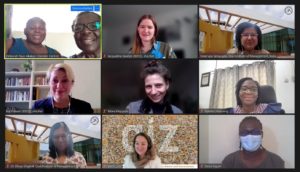How do socio-cultural norms influence transformative gender policy? The following kick-off workshop addressed different and joint ideas as well as expertise on various research approaches and objectives.

©IDOS
Participants from top left to bottom right: Deborah Tayo Akakpo (Gender Studies and Human Rights Documentation Centre, GSHRDC), Dorcas Coker-Appiah (GSHRDC), Jacqueline Götze (IDOS), Sreerupa Sengupta (Goa Institute of Management, GIM), Ina Friesen (IDOS), Tabea Heppner (GIZ), Fidelia Ohemeng (University of Ghana), Divya Singhal (GIM), Nora Pistor (GIZ), Deda Ogum (University of Ghana)
(Colleagues missing in the picture: Supriya Phadnis (GIM), Ananya Chakraborty (World Resources Institute, India), Stephan Klingebiel (IDOS))
On 31 January IDOS kicked-off the project ‚Local feminist perspectives as transformation levers for greater gender equality‘ with partner institutes in an online workshop. The project explores the potential of local feminist perspectives to act as levers for transformative change for greater gender equality and sustainable development in Ghana, India and Ukraine.
The online workshop provided a platform for the partner institutes, the Goa Institute of Management (GIM) in India and the Gender Studies and Human Rights Documentation Centre (GSHRDC) in Ghana, to present their research designs for studying local feminist perspectives in their respective regional and local context. The following discussion allowed all participants to exchange their ideas and expertise and learn more about the different research approaches and objectives.
The study, conducted by the Goa Institute of Management, looks at local feminist perspectives at the nexus of health and climate change, and explores how socio-cultural norms that intersect in these areas prevent gender transformative policies in India. The study by the Gender Studies and Human Rights Documentation Centre analyses past gender transformative policies in Ghana focussing on the influence of local feminist organisations’ perspectives on policy-making and the hindering impact of socio-cultural norms.
Applying a mix of qualitative methods and following a feminist research methodology, both studies look for alternative, feminist local approaches to sustainable development and their potential to influence feminist and gender policies towards greater gender equality.
There will be a second kick-off workshop with the Ukrainian partner institute, Gender in Detail, in early March. The next series of interim workshops of the project will take place in July 2024 in each of the partner countries.
